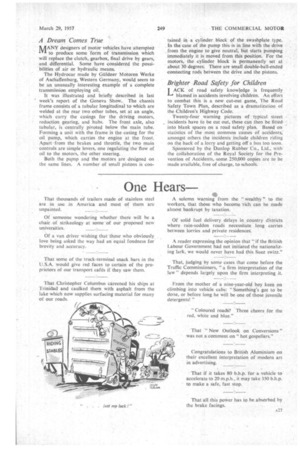One Hears
Page 29

If you've noticed an error in this article please click here to report it so we can fix it.
That thousands of trailers made of stainless steel are in use in America and most of them are unpainted.
Of someone wondering whether there will be a chair of strikeology at some of our proposed new universities.
Of a van driver wishing that those who obviously. love being asked the way had an equal fondness for brevity and accuracy.
That some of the truck-terminal snack bars in the U.S.A. would give red faces to certain of the proprietors of our transport cafes if they saw them.
That Christopher Columbus careened his ships at Trinidad and caulked them with asphalt from the lake which now supplies surfacing material for many of our roads. A solemn warning from the " wealthy " to the workers, that those who become rich can be made almost bankrupt by taxation.
Of solid fuel delivery delays in country districts where rain-sodden roads necessitate long carries between lorries and private residences.
A reader expressing the opinion that " if the British Labour Government had not initiated the nationalizing lark, we would never have had this Suez swizz."
That, judging by some cases that come before the Traffic Commissioners, "a firm interpretation of the law" depends largely upon the firm interpreting it.
From the mother of a nine-year-old boy keen on climbing into vehicle cabs: "Something's got to be done, or before long he will be one of those juvenile detergents! "
"Coloured roads? Three cheers for the red, white and blue."
That ." New Outlook on Conversions" was not a comment on" hot gospellers."
Congratulations to British Aluminium on their excellent interpretation of modern art in advertising.
That if it takes 80 b.h.p. for a vehicle to accelerate to 20 m.p.h., it may take 350 b.h.p. to make a safe, fast stop.
That all this power has to be absorbed by the brake facings.




























































































